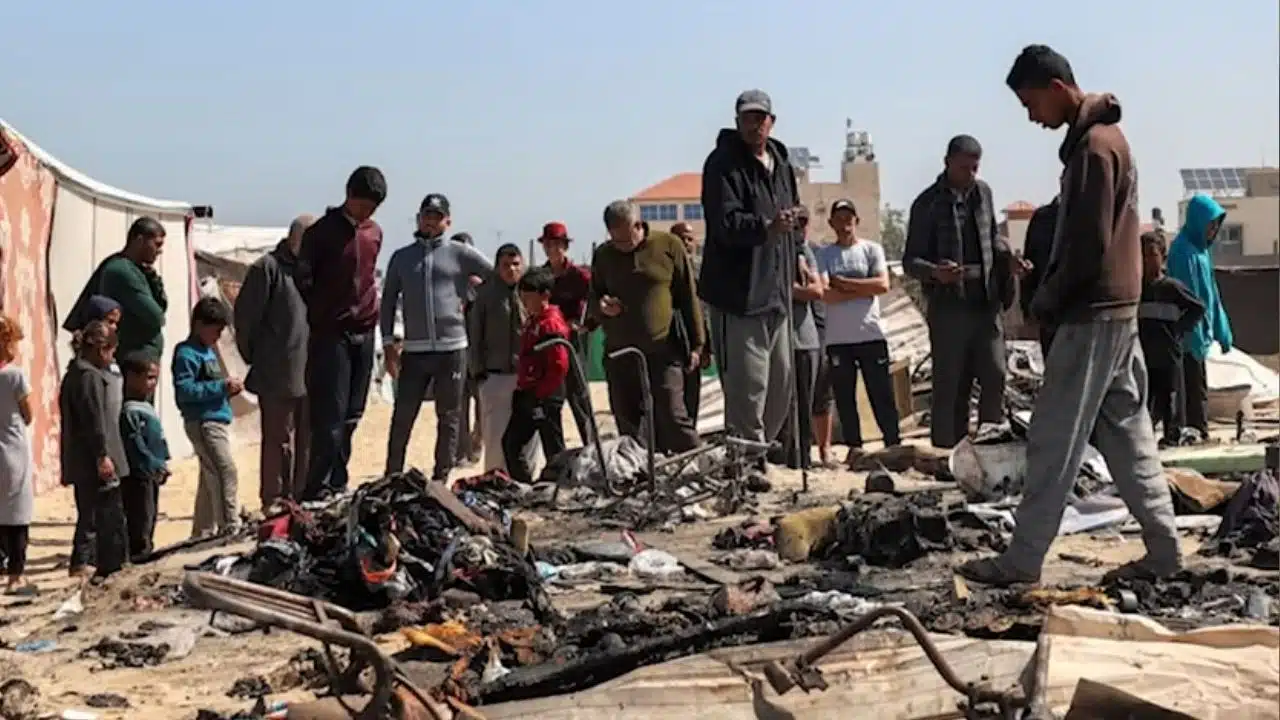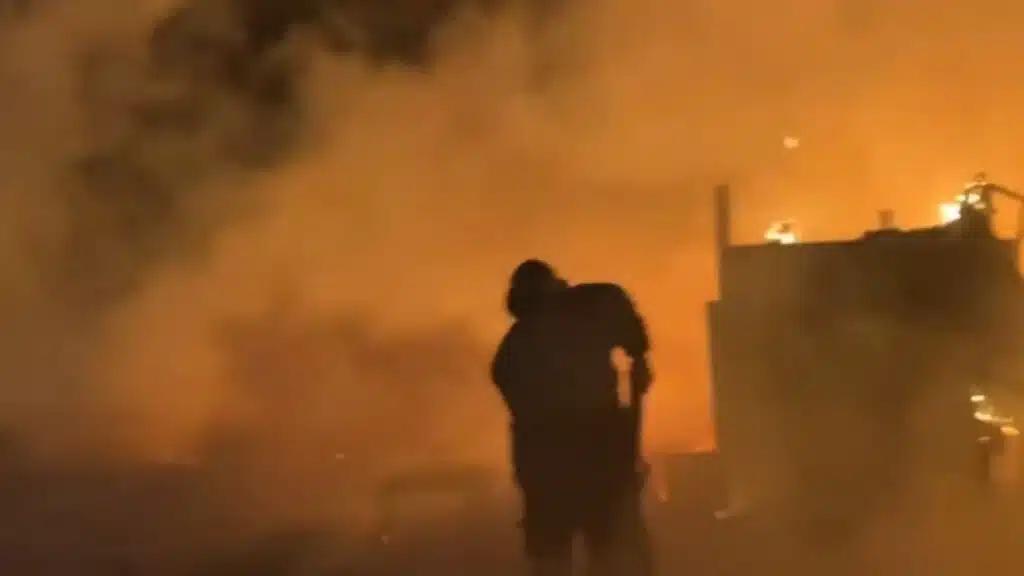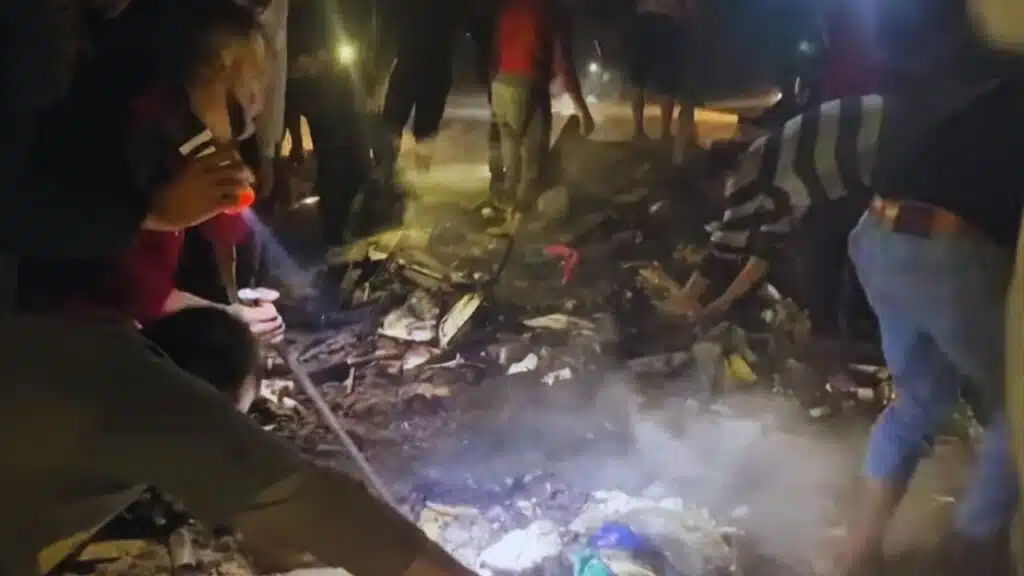At least 37 Palestinians, many of them women and children, were killed in a series of Israeli airstrikes that hit areas in southern Gaza where displaced civilians had taken shelter in tents, according to the Hamas-run civil defense agency. The deadliest strike occurred on Wednesday night in the coastal region of al-Mawasi, which had been designated by Israel as a safe zone for refugees.
The tragic scenes unfolded as tents were engulfed in flames, ignited by the force of what witnesses described as a “powerful” explosion. The attack has drawn strong international condemnation, with humanitarian agencies describing the event as a horrifying symbol of the human cost of the ongoing conflict.
Survivors Recount the Horror: “Screaming, Panic, and Fire Everywhere”
Eyewitnesses described the terrifying moments following the explosion in al-Mawasi. A survivor who spoke to the BBC’s Gaza Lifeline program shared his emotional account:
“I rushed outside and saw the tent next to mine engulfed in flames. Women were running out, trying desperately to escape the fire. Many martyrs were lost in the fire. We were helpless. It was heartbreaking to watch them die right in front of us.”
This man, along with others, tried to extinguish the fire by throwing sand, but their efforts were in vain. The blaze spread rapidly from one tent to another. Another survivor added that a “large number of children” were burned alive in the flames.
A displaced woman from Khan Younis told reporters that 10 members of a single family were killed while they were asleep. Five others from the same family sustained serious injuries.
Israel Acknowledges the Strike, Claims Hamas Target Was Hit
On Friday morning, the Israel Defense Forces (IDF) confirmed that they carried out an airstrike in the Khan Younis region, targeting what they described as a “Hamas terrorist” operating in the area. The IDF also acknowledged that civilian casualties may have occurred and said the incident is under review.
“The IDF is aware of the claim that several uninvolved civilians were harmed as a result of the strike. The incident is under review,” the IDF said in a statement shared with the BBC.
Despite assurances from the Israeli military that “steps were taken to mitigate harm to civilians,” the reality on the ground tells a different story. Human rights groups and international agencies have long warned that densely populated areas like Gaza—especially informal refugee encampments—are extremely vulnerable during military operations.
UNICEF Condemns the Attack: “Should Shake Us All to Our Core”
The attack has drawn international outrage, particularly due to the deaths of children in what was supposed to be a protected zone. Catherine Russell, Executive Director of the UN Children’s Fund (UNICEF), delivered a scathing response:
“Images of children burning while sheltering in makeshift tents should shake us all to our core.”
Russell and other humanitarian leaders emphasized that such tragedies reflect the systemic collapse of humanitarian protections in Gaza and demanded immediate accountability for strikes impacting civilians.
MSF Emergency Coordinator: “Most Victims Arrived Already Dead”
Médecins Sans Frontières (Doctors Without Borders), which has been working in Gaza throughout the conflict, confirmed that the strike happened close to their office. Amande Bazerolle, an MSF emergency coordinator, spoke to the BBC:
“Last night it was very close to our office in the south. When the tents were targeted and caught on fire, we received the patients. Most of them actually arrived dead, but we have some very critical patients.”
She added that the volume and severity of injuries are overwhelming local medical capacity, which has already been crippled by months of siege and repeated attacks on healthcare infrastructure.
More Strikes Reported Across Gaza, Dozens More Dead
The civil defense agency in Gaza reported further deadly airstrikes across the territory in the same 24-hour period:
- Beit Lahia (North Gaza): 7 people killed
- Near al-Mawasi (South Gaza): 2 more killed
- Jabalia refugee camp (North Gaza): 10 people killed, including 7 members of a single family
- Another strike hit a school building used as a civilian shelter, killing 3 more
In response to the reports of casualties in Beit Lahia, the IDF said it was “unaware of a strike corresponding to those reports.”
However, it confirmed that more than 100 targets were struck across Gaza in the past two days, including militant cells, weapons depots, and infrastructure linked to Hamas. The IDF also said it killed Yahya Fathi Abd al-Qader Abu Shaar, the alleged head of Hamas’ weapons smuggling network.
Gaza Blockade and Civilian Displacement: Over Half a Million Displaced Again
Since the resumption of the Israeli military offensive on March 18, following a brief ceasefire, the humanitarian situation has deteriorated sharply. According to the Hamas-run Health Ministry in Gaza, at least 1,691 people have been killed in Israeli attacks during this renewed offensive.
On March 1, Israel placed Gaza under a full blockade, severely restricting access to fuel, food, medicine, and other essentials. Following that, renewed evacuation orders and airstrikes have displaced more than 500,000 people, many of whom had already been displaced multiple times during the war.
Israel has also turned 30% of Gaza’s territory into “security buffer zones,” further reducing the already shrinking safe zones available for civilians.
Humanitarian Agencies Warn of “Total Collapse”
On Thursday, the heads of 12 major international humanitarian agencies, including Save the Children, Oxfam, and the Norwegian Refugee Council, issued a joint statement warning of the imminent collapse of the humanitarian aid system in Gaza.
“This is one of the worst humanitarian failures of our generation.”
They called for an immediate ceasefire, unhindered humanitarian access, and protection for aid workers and civilians. Reports suggest that essential services—such as clean water, sanitation, and emergency healthcare—are now virtually nonexistent in many parts of the Gaza Strip.
While Israel claims there is no shortage of aid, saying 25,000 truckloads of supplies entered Gaza during previous ceasefires, on-the-ground agencies dispute this, saying distribution has been uneven, and access routes remain blocked or unsafe.
Ceasefire Talks Collapse: Hamas Rejects Israeli Proposal
The conflict’s diplomatic front also saw setbacks this week. Hamas has formally rejected Israel’s latest ceasefire proposal, which offered a 45-day truce in exchange for the release of 10 hostages.
In a video statement, Khalil al-Hayya, head of Hamas’s negotiation team, said the group would not accept what he called “partial deals” designed to serve Prime Minister Benjamin Netanyahu’s political agenda.
Hamas says it is ready to negotiate a comprehensive deal that includes the release of all 59 hostages it still holds, 24 of whom are believed to be alive, in exchange for a complete end to the war.
Responding to Hamas’ rejection, Israel’s National Security Minister Bezalel Smotrich, a prominent far-right figure, said:
“It is time to open the gates of hell on Hamas.”
War Timeline and Casualty Update
The war began on October 7, 2023, when Hamas launched a surprise cross-border attack on Israeli communities, killing around 1,200 people and taking 251 hostages, according to Israeli sources.
Since then, the conflict has escalated into one of the deadliest wars in the 21st century. The Hamas-run health ministry in Gaza reports that at least 51,065 Palestinians have been killed since the war began. This includes militants, civilians, and a large number of children, although Israel contests the casualty breakdown.
The situation remains fluid, and the death toll is expected to rise as bombardments continue and medical services collapse under pressure.
A Dire Call for Immediate Action
The tragic events in al-Mawasi and other parts of Gaza this week reflect the intensifying humanitarian crisis and the growing desperation of those caught in the crossfire. As civilian casualties mount, international organizations are urging both parties to return to negotiations and prioritize the protection of innocent lives.
The world watches as Gaza descends further into chaos, and calls for ceasefire, humanitarian access, and political resolution grow louder by the day.
The Information is Collected from BBC and Yahoo.






































